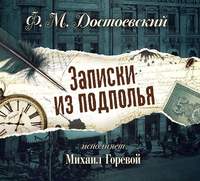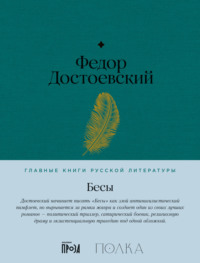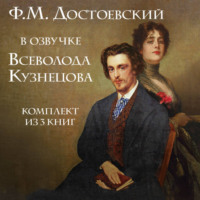 полная версия
полная версияUncle's Dream; and The Permanent Husband
Maria Alexandrovna's voice was tender to a sickly extent. Her face showed the pain she was suffering. The amazed Mosgliakoff sat down beside her in the arm-chair.
“You hid somewhere, and listened, I suppose?” she began, looking reproachfully into his face.
“Yes I did, of course I did; and a good thing too! What a fool I should have looked if I hadn't! At all events now I know what you have been plotting against me!” replied the injured man, rudely; encouraging and supporting himself by his own fury.
“And you – and you – with your principles, and with your bringing up, could condescend to such an action – Oh, oh!”
Mosgliakoff jumped up.
“Maria Alexandrovna, this is a little too much!” he cried. “Consider what you condescend to do, with your principles, and then judge of other people.”
“One more question,” she continued, without replying to his outburst: “who recommended you to be an eavesdropper; who told you anything; who is the spy here? That's what I wish to know!”
“Oh, excuse me; that I shall not tell you!”
“Very well; I know already. I said, Paul, that I was in some degree to blame before you. But if you look into the matter you will find that if I am to blame it is solely in consequence of my anxiety to do you a good turn!”
“What? a good turn —me? No, no, madam! I assure you I am not to be caught again! I'm not quite such a fool!”
He moved so violently in his arm-chair that it shook again.
“Now, do be cool, if you can, my good friend. Listen to me attentively, and you will find that what I say is only the bare truth. In the first place I was anxious to inform you of all that has just taken place, in which case you would have learned everything, down to the smallest detail, without being obliged to descend to eavesdropping! If I did not tell you all before, it was simply because the whole matter was in an embryo condition in my mind. It was then quite possible that what has happened would never happen. You see, I am quite open with you.
“In the second place, do not blame my daughter. She loves you to distraction; and it was only by the exercise of my utmost influence that I persuaded her to drop you, and accept the prince's offer.”
“I have just had the pleasure of receiving convincing proof of her ‘love to distraction!’ ” remarked Mosgliakoff, ironically and bitterly.
“Very well. But how did you speak to her? As a lover should speak? Again, ought any man of respectable position and tone to speak like that? You insulted and wounded her!”
“Never mind about my ‘tone’ now! All I can say is that this morning, when I went away with the prince, in spite of both of you having been as sweet as honey to me before, you reviled me behind my back like a pickpocket! I know all about it, you see!”
“Yes, from the same dirty source, I suppose?” said Maria Alexandrovna, smiling disdainfully. “Yes, Paul, I did revile you: I pitched into you considerably, and I admit it frankly. But it was simply that I was bound to blacken you before her. Why? Because, as I have said, I required her to consent to leave you, and this consent was so difficult to tear from her! Short-sighted man that you are! If she had not loved you, why should I have required so to blacken your character? Why should I have been obliged to take this extreme step? Oh! you don't know all! I was forced to use my fullest maternal authority in order to erase you from her heart; and with all my influence and skill I only succeeded in erasing your dear image superficially and partially! If you saw and heard all just now, it cannot have escaped you that Zina did not once, by either word or gesture, encourage or confirm my words to the prince? Throughout the whole scene she said not one word. She sang, but like an automaton! Her whole soul was in anguish, and at last, out of pity for her, I took the prince away. I am sure, she cried, when I left her alone! When you entered the room you must have observed tears in her eyes?”
Mosgliakoff certainly did recall the fact that when he rushed into the room Zina was crying.
“But you —you– why were you so against me, Maria Alexandrovna?” he cried. “Why did you revile me and malign me, as you admit you did?”
“Ah, now that's quite a different question. Now, if you had only asked me reasonably at the beginning, you should have had your answer long ago! Yes, you are right. It was I, and I alone, who did it all. Do not think of Zina in the matter. Now, why did I do it? I reply, in the first place, for Zina's sake. The prince is rich, influential, has great connections, and in marrying him Zina will make a brilliant match. Very well; then if the prince dies – as perhaps he will die soon, for we are all mortal, – Zina is still young, a widow, a princess, and probably very rich. Then she can marry whom she pleases; she may make another brilliant match if she likes. But of course she will marry the man she loves, and loved before, the man whose heart she wounded by accepting the prince. Remorse alone would be enough to make her marry the man whom she had loved and so deeply injured!”
“Hem!” said Paul, gazing at his boots thoughtfully.
“In the second place,” continued Maria, “and I will put this shortly, because, though you read a great deal of your beloved Shakespeare, and extract his finest thoughts and ideals, yet you are very young, and cannot, perhaps, apply what you read. You may not understand my feelings in this matter: listen, however. I am giving my Zina to this prince partly for the prince's own sake, because I wish to save him by this marriage. We are old friends; he is the dearest and best of men, he is a knightly, chivalrous gentleman, and he lives helpless and miserable in the claws of that devil of a woman at Donchanovo! Heaven knows that I persuaded Zina into this marriage by putting it to her that she would be performing a great and noble action. I represented her as being the stay and the comfort and the darling and the idol of a poor old man, who probably would not live another year at the most! I showed her that thus his last days should be made happy with love and light and friendship, instead of wretched with fear and the society of a detestable woman. Oh! do not blame Zina. She is guiltless. I am not – I admit it; for if there have been calculations it is I who have made them! But I calculated for her, Paul; for her, not myself! I have outlived my time; I have thought but for my child, and what mother could blame me for this?” Tears sparkled in the fond mother's eyes. Mosgliakoff listened in amazement to all this eloquence, winking his eyes in bewilderment.
“Yes, yes, of course! You talk well, Maria Alexandrovna, but you forget – you gave me your word, you encouraged me, you gave me my hopes; and where am I now? I have to stand aside and look a fool!”
“But, my dear Paul, you don't surely suppose that I have not thought of you too! Don't you see the huge, immeasurable gain to yourself in all this? A gain so vast that I was bound in your interest to act as I did!”
“Gain for me! How so?” asked Paul, in the most abject state of confusion and bewilderment.
“Gracious Heavens! do you mean to say you are really so simple and so short-sighted as to be unable to see that?” cried Maria Alexandrovna, raising her eyes to the ceiling in a pious manner. “Oh! youth, youth! That's what comes of steeping one's soul in Shakespeare! You ask me, my dear friend Paul, where is the gain to you in all this. Allow me to make a little digression. Zina loves you – that is an undoubted fact. But I have observed that at the same time, and in spite of her evident love, she is not quite sure of your good feeling and devotion to her; and for this reason she is sometimes cold and self-restrained in your presence. Have you never observed this yourself, Paul?”
“Certainly; I did this very day; but go on, what do you deduce from that fact?”
“There, you see! you have observed it yourself; then of course I am right. She is not quite sure of the lasting quality of your feeling for her! I am a mother, and I may be permitted to read the heart of my child. Now, then, supposing that instead of rushing into the room and reproaching, vilifying, even swearing at and insulting this sweet, pure, beautiful, proud being, instead of hurling contempt and vituperation at her head – supposing that instead of all this you had received the bad news with composure, with tears of grief, maybe; perhaps even with despair – but at the same time with noble composure of soul – ”
“H'm!”
“No, no – don't interrupt me! I wish to show you the picture as it is. Very well, supposing, then, that you had come to her and said, ‘Zina, I love you better than my life, but family considerations must separate us; I understand these considerations – they are devised for your greater happiness, and I dare not oppose them. Zina, I forgive you; be happy, if you can!’ – think what effect such noble words would have wrought upon her heart!”
“Yes – yes, that's all very true, I quite understand that much! but if I had said all this, I should have had to go all the same, without satisfaction!”
“No, no, no! don't interrupt me! I wish to show you the whole picture in all its detail, in order to impress you fully and satisfactorily. Very well, then, imagine now that you meet her in society some time afterwards: you meet perhaps at a ball – in the brilliant light of a ball-room, under the soothing strains of music, and in the midst of worldly women and of all that is gay and beautiful. You alone are sad – thoughtful – pale, – you lean against some pillar (where you are visible, however!) and watch her. She is dancing. You hear the strains of Strauss, and the wit and merriment around you, but you are sad and wretched.
“What, think you, will Zina make of it? With what sort of eyes will she gaze on you as you stand there? ‘And I could doubt this man!’ she will think, ‘this man who sacrificed all, all, for my sake – even to the mortal wounding of his heart!’ Of course the old love will awake in her bosom and will swell with irresistible power!”
Maria Alexandrovna stopped to take breath. Paul moved violently from side to side of his chair.
“Zina now goes abroad for the benefit of the prince's health – to Italy – to Spain,” she continued, “where the myrtle and the lemon tree grow, where the sky is so blue, the beautiful Guadalquiver flows! to the land of love, where none can live without loving; where roses and kisses – so to speak – breathe in the very air around. You follow her – you sacrifice your business, friends, everything, and follow her. And so your love grows and increases with irresistible might. Of course that love is irreproachable – innocent – you will languish for one another – you will meet frequently; of course others will malign and vilify you both, and call your love by baser names – but your love is innocent, as I have purposely said; I am her mother – it is not for me to teach you evil, but good. At all events the prince is not in the condition to keep a very sharp look-out upon you; but if he did, as if there would be the slightest ground for base suspicion? Well, the prince dies at last, and then, who will marry Zina, if not yourself? You are so distant a relative of the prince's that there could be no obstacle to the match; you marry her – she is young still, and rich. You are a grandee in an instant! you, too, are rich now! I will take care that the prince's will is made as it should be; and lastly, Zina, now convinced of your loyalty and faithfulness, will look on you hereafter as her hero, as her paragon of virtue and self-sacrifice! Oh! you must be blind, —blind, not to observe and calculate your own profit when it lies but a couple of strides from you, grinning at you, as it were, and saying, ‘Here, I am yours, take me! Oh, Paul, Paul!’ ”
“Maria Alexandrovna!” cried Mosgliakoff, in great agitation and excitement, “I see it all! I have been rude, and a fool, and a scoundrel too!” He jumped up from his chair and tore his hair.
“Yes, and unbusinesslike, that's the chief thing – unbusinesslike, and blindly so!” added Maria Alexandrovna.
“I'm an ass! Maria Alexandrovna,” he cried in despair. “All is lost now, and I loved her to madness!”
“Maybe all is not lost yet!” said this successful orator softly, and as though thinking out some idea.
“Oh! if only it could be so! help me – teach me. Oh! save me, save me!”
Mosgliakoff burst into tears.
“My dear boy,” said Maria Alexandrovna, sympathetically, and holding out her hand, “you acted impulsively, from the depth and heat of your passion – in fact, out of your great love for her; you were in despair, you had forgotten yourself; she must understand all that!”
“Oh! I love her madly! I am ready to sacrifice everything for her!” cried Mosgliakoff.
“Listen! I will justify you before her.”
“Oh, Maria Alexandrovna!”
“Yes, I will. I take it upon myself! You come with me, and you shall tell her exactly what I said!”
“Oh, how kind, how good you are! Can't we go at once, Maria Alexandrovna?”
“Goodness gracious, no! What a very green hand you are, Paul! She's far too proud! she would take it as a new rudeness and impertinence! To-morrow I shall arrange it all comfortably for you: but now, couldn't you get out of the way somewhere for a while, to that godfather of yours, for instance? You could come back in the evening, if you pleased; but my advice would be to stay away!”
“Yes, yes! I'll go – of course! Good heavens, you've made a man of me again! – Well, but look here – one more question: – What if the prince does not die so soon?”
“Oh, my dear boy, how delightfully naïve you are! On the contrary, we must pray for his good health! We must wish with all our hearts for long life to this dear, good, and chivalrous old man! I shall be the first to pray day and night for the happiness of my beloved daughter! But alas! I fear the prince's case is hopeless; you see, they must visit the capital now, to bring Zina out into society. – I dreadfully fear that all this may prove fatal to him; however, we'll pray, Paul, we can't do more, and the rest is in the hands of a kind Providence. You see what I mean? Very well – good-bye, my dear boy, bless you! Be a man, and wait patiently – be a man, that's the chief thing! I never doubted your generosity of character; but be brave – good-bye!” She pressed his hand warmly, and Mosgliakoff walked out of the room on tip-toes.
“There goes one fool, got rid of satisfactorily!” observed Maria Alexandrovna to herself, – “but there are more behind – !”
At this moment the door opened, and Zina entered the room. She was paler than usual, and her eyes were all ablaze.
“Mamma!” she said, “be quick about this business, or I shall not be able to hold out. It is all so dirty and mean that I feel I must run out of the house if it goes on. Don't drive me to desperation! I warn you – don't weary me out – don't weary me out!”
“Zina – what is it, my darling? You – you've been listening?” cried Maria Alexandrovna, gazing intently and anxiously at her daughter.
“Yes, I have; but you need not try to make me ashamed of myself as you succeeded in doing with that fool. Now listen: I solemnly swear that if you worry and annoy me by making me play various mean and odious parts in this comedy of yours, – I swear to you that I will throw up the whole business and put an end to it in a moment. It is quite enough that I have consented to be a party in the main and essence of the base transactions; but – but – I did not know myself, I am poisoned and suffocated with the stench of it!” – So saying, she left the room and banged the door after her.
Maria Alexandrovna looked fixedly after her for a moment, and reflected.
“I must make haste,” she cried, rousing herself; “she is the greatest danger and difficulty of all! If these detestable people do not let us alone, instead of acting the town-criers all over the place (as I fear they are doing already!) – all will be lost! She won't stand the worry of it – she'll drop the business altogether! – At all hazards, I must get the prince to the country house, and that quickly, too! I shall be off there at once, first, and bring my fool of a husband up: he shall be made useful for once in his life! Meanwhile the prince shall have his sleep out, and when he wakes up I shall be back and ready to cart him away bodily!”
She rang the bell.
“Are the horses ready?” she inquired of the man.
“Yes, madam, long ago!” said the latter.
She had ordered the carriage the moment after she had taken the prince upstairs.
Maria Alexandrovna dressed hurriedly, and then looked in at Zina's room for a moment, before starting, in order to tell her the outlines of her plan of operations, and at the same time to give Zina a few necessary instructions. But her daughter could not listen to her. She was lying on her bed with face hidden in the pillows, crying, and was tearing her beautiful hair with her long white hands: occasionally she trembled violently for a moment, as though a blast of cold had passed through all her veins. Her mother began to speak to her, but Zina did not even raise her head!
Having stood over her daughter in a state of bewilderment for some little while, Maria Alexandrovna left the room; and to make up for lost time bade the coachman drive like fury, as she stepped into the carriage.
“I don't quite like Zina having listened!” she thought as she rattled away. “I gave Mosgliakoff very much the same argument as to herself: she is proud, and may easily have taken offence! H'm! Well, the great thing is to be in time with all the arrangements, – before people know what I am up to! Good heavens, fancy, if my fool of a husband were to be out!!”
And at the very thought of such a thing, Maria Alexandrovna's rage so overcame her that it was clear her poor husband would fare badly for his sins if he proved to be not at home! She twisted and turned in her place with impatience, – the horses almost galloped with the carriage at their heels.
CHAPTER X
On they flew.
I have said already that this very day, on her first drive after the prince, Maria Alexandrovna had been inspired with a great idea! and I promised to reveal this idea in its proper place. But I am sure the reader has guessed it already! – It was, to “confiscate” the prince in her turn, and carry him off to the village where, at this moment, her husband Afanassy Matveyevitch vegetated alone.
I must admit that our heroine was growing more and more anxious as the day went on; but this is often the case with heroes of all kinds, just before they attain their great ends! Some such instinct whispered to her that it was not safe to remain in Mordasoff another hour, if it could be avoided; – but once in the country house, the whole town might go mad and stand on its head, for all she cared!
Of course she must not lose time, even there! All sorts of things might happen – even the police might interfere. (Reader, I shall never believe, for my part, that my heroine really had the slightest fear of the vulgar police force; but as it has been rumoured in Mordasoff that at this moment such a thought did pass through her brain, why, I must record the fact.)
In a word she saw clearly that Zina's marriage with the prince must be brought about at once, without delay! It was easily done: the priest at the village should perform the ceremony; why not the day after to-morrow? or indeed, in case of need, to-morrow? Marriages had often been brought about in less time than this – in two hours, she had heard! It would be easy enough to persuade the prince that haste and simplicity would be in far better taste than all the usual pomps and vanities of common everyday weddings. In fact, she relied upon her skill in putting the matter to the old man as a fitting dramatic issue to a romantic story of love, and thus to touch the most sensitive string of his chivalrous heart.
In case of absolute need there was always the possibility of making him drunk, or rather of keeping him perpetually drunk. And then, come what might, Zina would be a princess! And if this marriage were fated to produce scandal among the prince's relations and friends in St. Petersburg and Moscow, Maria Alexandrovna comforted herself with the reflection that marriages in high life nearly always were productive of scandal; and that such a result might fairly be looked upon as “good form,” and as peculiar to aristocratic circles.
Besides, she felt sure that Zina need only show herself in society, with her mamma to support her, and every one of all those countesses and princes should very soon either acknowledge her of their own accord, or yield to the head-washing that Maria Alexandrovna felt herself so competent to give to any or all of them, individually or collectively.
It was in consequence of these reflections that Maria Alexandrovna was now hastening with all speed towards her village, in order to bring back Afanassy Matveyevitch, whose presence she considered absolutely necessary at this crisis. It was desirable that her husband should appear and invite the prince down to the country: she relied upon the appearance of the father of the family, in dress-coat and white tie, hastening up to town on the first rumours of the prince's arrival there, to produce a very favourable impression upon the old man's self-respect: it would flatter him; and after such a courteous action, followed by a polite and warmly-couched invitation to the country, the prince would hardly refuse to go.
At last the carriage stopped at the door of a long low wooden house, surrounded by old lime trees. This was the country house, Maria Alexandrovna's village residence.
Lights were burning inside.
“Where's my old fool?” cried Maria Alexandrovna bursting like a hurricane into the sitting-room.
“Whats this towel lying here for? – Oh! – he's been wiping his head, has he. What, the baths again! and tea – of course tea! – always tea! Well, what are you winking your eyes at me for, you old fool? – Here, why is his hair not cropped? Grisha, Grisha! – here; why didn't you cut your master's hair, as I told you?”
Maria Alexandrovna, on entering the room, had intended to greet her husband more kindly than this; but seeing that he had just been to the baths and that he was drinking tea with great satisfaction, as usual, she could not restrain her irritable feelings.
She felt the contrast between her own activity and intellectual energy, and the stolid indifference and sheep-like contentedness of her husband, and it went to her heart!
Meanwhile the “old fool,” or to put it more politely, he who had been addressed by that title, sat at the tea-urn, and stared with open mouth, in abject alarm, opening and shutting his lips as he gazed at the wife of his bosom, who had almost petrified him by her sudden appearance.
At the door stood the sleepy, fat Grisha, looking on at the scene, and blinking both eyes at periodical intervals.
“I couldn't cut his hair as you wished, because he wouldn't let me!” he growled at last. “ ‘You'd better let me do it!’ – I said, ‘or the mistress'll be down one of these days, and then we shall both catch it!’ ”
“No,” he says, “I want it like this now, and you shall cut it on Sunday. I like it long!”
“What! – So you wish to curl it without my leave, do you! What an idea – as if you could wear curls with your sheep-face underneath! Good gracious, what a mess you've made of the place; and what's the smell – what have you been doing, idiot, eh!” cried Maria Alexandrovna, waxing more and more angry, and turning furiously upon the wretched and perfectly innocent Afanassy!
“Mam – mammy!” muttered the poor frightened master of the house, gazing with frightened eyes at the mistress, and blinking with all his might – “mammy!”
“How many times have I dinned into your stupid head that I am not your ‘mammy.’ How can I be your mammy, you idiotic pigmy? How dare you call a noble lady by such a name; a lady whose proper place is in the highest circles, not beside an ass like yourself!”
“Yes – yes, – but – but, you are my legal wife, you know, after all; – so I – it was husbandly affection you know – ” murmured poor Afanassy, raising both hands to his head as he spoke, to defend his hair from the tugs he evidently expected.









